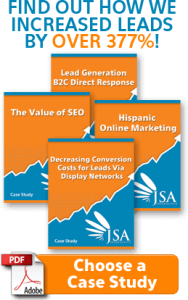Remarketing, when used correctly, can be one of the most powerful tools in any business’s marketing arsenal, but to really make the most of what it has to offer you, you have to understand how it works.
What is Remarketing?
If you’ve heard the term “behavioral targeting” before, then you already know what we’re talking about here. “Remarketing” is, in essence, exactly what it sounds like – marketing something to someone you’ve already marketed that something (or a related item) to in the past. Remarketing is a way to get your product or service in front of people that have already shown an interest in whatever you’ve got to sell. This is accomplished by “following” the user around his or her travels on the Internet, and serving them ads for those products or services they’ve looked at in the past. Banner ads are a commonly used tool in remarketing, as are targeted emails.
Who Should Use It
Anyone that has something to sell can benefit from remarketing, but it is particularly useful to vendors whose products or services often include a lengthy decision-making process. An easy way to instantly see what we mean is to head over to Tiger Direct, and search for a laptop. Once you navigate away from Tiger Direct, you’ll very likely begin to see Tiger Direct ads for laptops all over the place. This is remarketing, and it’s an effective use of Tiger Direct’s marketing budget, because when making an expensive purchase, most people will do a lot of online research beforehand. If they browse Tiger Direct’s laptop category, but don’t make a purchase right away, that doesn’t mean they aren’t going to buy at all. It usually just means they need more time to think and weigh their options. Manage to serve them a few ads tailored specifically to what they’re pondering buying, and boom – a sale is likely to follow.
Furthermore, even if you don’t get the sale right away, the remarketing process is still a boon to your business, because it raises brand awareness. If someone routinely sees an ad from a certain company, they will remember that company, even if it takes them a year to get around to buying something from them, much as we see happen with television commercials.
But Be Careful
Remarketing is not without its drawbacks, though – the most glaring of which is the fact that most people just don’t understand how it actually works and therefore dismiss it out of hand. Privacy concerns can often provoke a knee-jerk reaction from both users and advertisers, because people can feel like they’re being “spied on.” Fortunately, remarketing is not actually spying. No personally identifiable information is used to serve the ads to the users. The only thing that is recorded is the fact that someone visited that site. And that means remarketing is entirely ethical – and a good thing, too, because it has the potential to really boost your ROI over time.
An effective remarketing campaign will not only raise awareness of your brand, but also present you with more chances to make a sale from a single user. Multiply that by however many users you’ve got, and you’re looking at some potentially major bank just for positioning yourself to offer something people were already looking to buy in the first place.
[single_callout/]













